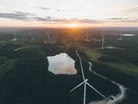IEA: Clean Energy Technology Market to Triple by 2035

According to a new, first-of-its-kind report by the International Energy Agency (IEA), the global market for key clean energy technologies is poised for explosive growth, with projections indicating a threefold increase to more than US$2tn by 2035.
The Energy Technology Perspectives 2024 (ETP 2024) report, published in late October, provides readers with a comprehensive analysis of the complicated interplay between energy, industrial and trade policies as nations vie for position in the rapidly evolving clean energy landscape.
Significant growth in clean technologies
The report focuses on six primary mass-manufactured clean energy technologies: solar PV, wind turbines, electric cars, batteries, electrolysers and heat pumps. Based on current policy settings, the market for these technologies is expected to surge from US$700bn in 2023 to over US$2tn by 2035, rivalling the value of the global crude oil market in recent years.
IEA Executive Director Fatih Birol is eager to emphasise the significance of these projections. He says: "The market for clean technologies is set to multiply in value in the coming decade, increasingly catching up with the markets for fossil fuels.
"As countries seek to define their role in the new energy economy, three vital policy areas – energy, industry and trade – are becoming more and more interlinked."
Investment trends and manufacturing hubs
The report highlights a record wave of investment in clean technology manufacturing, with China, the European Union, the United States and India leading the charge. Despite significant policy initiatives in these regions, China is projected to maintain its position as the world's manufacturing powerhouse.
In fact, by 2035, Chinese clean technology exports are expected to exceed US$340bn, comparable to the combined projected oil export revenue of Saudi Arabia and the United Arab Emirates this year. The significance of this cannot be understated; the day renewable energy exports outstrip the exports of fossil fuels, humanity will have reached a major milestone in the global quest for a sustainable future.
However, the IEA stresses that opportunities in the clean energy economy remain open to countries at various stages of development. The report identifies potential avenues for emerging and developing economies based on a comprehensive assessment of over 60 indicators, including business environment, infrastructure and resource availability.
Emerging economies and their potential
Southeast Asia could become one of the most cost-effective regions for producing polysilicon and wafers for solar panels within the next decade. Latin America, particularly Brazil, has the potential to scale up wind turbine manufacturing for export to other American markets. North Africa could emerge as an electric vehicle manufacturing hub, while several sub-Saharan African countries could produce iron using low-emissions hydrogen.
Fatih emphasised the importance of inclusive growth in the sector: "Growth in the manufacturing and trade of clean energy technologies should be for the benefit of many economies, not just a few. This report shows that countries in Southeast Asia, Latin America, Africa and beyond have strong potential to play important roles in the new energy economy."
Growth in the manufacturing and trade of clean energy technologies should be for the benefit of many economies, not just a few.
Global implications of clean technology trade
The report also explores the global implications of expanding trade in clean energy technologies. While the shift from importing fossil fuels to clean technologies could enhance energy supply resilience, new security considerations emerge.
For example, approximately half of all maritime trade in clean energy technologies currently passes through the Strait of Malacca, significantly more than the 20% of fossil fuel trade that traverses the Strait of Hormuz.
As nations navigate this complex landscape, Faith cautions: "While this leaves governments with tough and complicated decisions ahead, this ground breaking new IEA report provides a strong, data-driven foundation for their decisions."
Receive the next edition of ClimateTech Digital by signing up for its newsletter.
As part of this portfolio, make sure you check out Sustainability Magazine and Energy Digital and also sign up to our global conference series - Sustainability LIVE.
ClimateTech Digital is a BizClik brand
